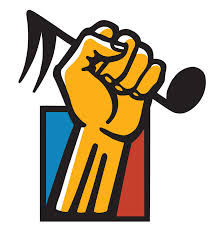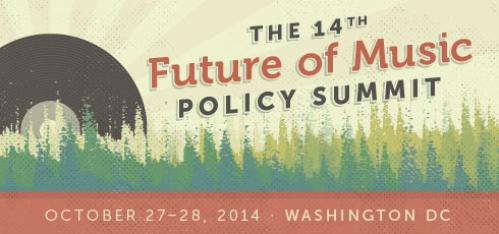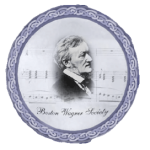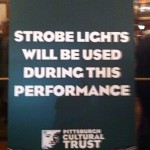
Greetings from Washington, D.C., music nerds! I am here to attend the Future of Music Policy Summit, which addresses a side of the music profession I could stand to learn more about: policy, technology, law, how the money comes in and how it goes out, and more.
I recently spoke with Future of Music Coalition staff member Jean Cook about out how the topics addressed at the summit impact classical music specifically. (She is unable to travel from her home in New York to attend, for immanent maternity reasons!) Read on to find out why our genre is often rendered invisible in the digital music landscape today, and why Shazam initially attributed every classical recording to the same classical artist (one who was prolific to be sure, but still!).
MMN
What is the Future of Music Coalition all about?
JC
FMC is a research, education, and advocacy organization. We work on issues that impact artists’ ability to reach audiences, make a living with their work, do things like have a mortgage and health insurance, and be able to do what they want to do.
We’ve done a lot of research to better understand the landscape for musicians, including the Artist Revenue Streams Project, which is one of the first studies looking at musician income that includes classical, and jazz, and rock, and all of the different genres in one group. We’re able to do apples to apples comparisons instead of apples to oranges, which the classical music community is frequently left doing when they try to understand their place in the emerging digital marketplace. How does innovation apply to our field, and how can success by other artists be replicated by classical musicians? The answer is often very complicated, which can be frustrating, but that’s one very valuable thing about the research we’ve been doing: we’re able to look side by side at how different musicians do it.
Research is one big portion of the work that FMC does; education is another. We’ve been doing artist education for a number of years, in a lot of different areas. The summit is probably the biggest, highest profile example of the education we do, where we bring together a lot of different kinds of folks — policy makers, advocates, industry people, lawyers, technology wonks, but also musicians — and we take a very specific point of view, which is to look from a musician’s perspective at the emerging controversial or confusing issues that might be swirling around when it comes to what’s happening with the future of music.
We also do some advocacy. We tend not to take positions on issues, unless it’s just kind of a no-brainer. We serve more as an info clearinghouse, on rate-setting for streaming services, for example. That’s FMC in a nutshell; we’ve been around since 2000.
MMN
What are controversial and confusing issues swirling around right now?
JC
It depends on where in the industry you live, and what your priorities are. Certainly a lot of people talk about Spotify and streaming, and if that’s the future. But I have seen very little evidence that streaming is a significant factor in income for musicians. I think it’s more of a cultural discussion about how you put together a system that pays artists fractions of pennies for the work they do. How do you ensure that artists are getting paid what they’re supposed to get paid? What kind of oversight do they have over the building of these structures, and what kind of audit capability would they have to ensure that all the systems are working the way they’re supposed to? Those are extremely important questions for artists, especially for classical musicians.
I’ve written an article on metadata, and another on what I call “invisible genres.” The metadata article gives an overview of the infrastructure concerns, and the invisible genres article shows how these concerns are compounded by the unique needs of the classical music community in the digital marketplace. These are all going to have to be addressed and overcome before classical music can robustly participate and benefit from the digital future.
The vast majority of income for classical musicians comes from live performance and teaching. Whether that’s because of the strong tradition of performance in classical music, or because of the barriers to the marketplace for recorded music for classical, it’s hard to say. But I think we’re getting ready as a field to try and address how these infrastructure concerns are going to be dealt with over the next decade or two.
MMN
I read the article about metadata, which is very fascinating. What kind of response have you received? Has there been any progress or improvement on that front?
JC
I think this is an issue that is easy for people to get now, as opposed to 6 or 7 years ago, especially in classical music. As it becomes more of a concern that people can understand, it’s easier to build support for trying to coordinate on solutions. It’s really about doing right by the artists, doing right by the music, doing what you can to stay alive, certainly, but at the end of the day, quality is much more important than quantity. One of the reasons why so many of the issues outlined in the metadata article have not yet been resolved in other parts of the industry is because of an unwillingness to build supportive structures where people can find mutual solutions, even if they may not be commercially beneficial.
With classical music being only 3% of the marketplace, it’s always kind of like the — red-headed stepchild, I guess is what they call it? It’s the thing that everybody knows they need to take care of, but it’s always on the list, and there’s always other things on the list that are higher up that need to get addressed right away. So I think that’s a blessing and a curse. It’s a curse in that some of these problems don’t get solved, and it is up to the classical community to do it themselves. But it’s also a blessing because you probably don’t want people who aren’t from the classical community trying to solve some of these problems, because they don’t have the knowledge. The fact that the classical community does communicate, and they are willing to find solutions and work together and cooperate is very promising.
MMN
Do you think there might need to be an alternative platform for classical music that has a more comprehensive metadata structure?
JC
Well, I think you can see people working on it in bits and pieces. Naxos has figured out how to put together a structure that works for libraries and for the record labels they distribute. They’ve made a lot of progress there. Arkivmusic has devoted a lot of time and effort to building a database that can serve classical music fans.
I used to work for a classical presenter, and I also worked for a classical radio station. When I think about what the future for classical music, and who are the future audiences, I’m very happy to see that progress is being made in certain areas of the classical field, but in order to increase the footprint and raise the visibility of the art form outside the initiated, there will have to be collaboration and partnership with the mainstream services. Because ultimately, being isolated is not a long-term strategy for our field.
MMN
Right — we are siloed off in a way that keeps new listeners from realizing that they might even like classical music.
JC
Yeah. I mean, it’s great that you can find everything on Arkivmusic, but you can’t allow for discovery for people who like hair metal bands who might also like Bruckner. That just can’t happen in Arkivmusic. The only place that could happen would be on a major platform that also carries other kinds of music.
MMN
When you’ve talked about this metadata issue to people who are knowledgable about the music field, but not knowledgable specifically about classical music, you said sometimes they don’t get it. Is there anyone who has gotten it, and said anything that might lead you to believe there’s a solution in the future?
JC
Oh, sure. I think within every bureaucratic structure that exists — and there are many of them in the music industry — you will find one or two people who know something about classical music, and care about it. I really think there aren’t [enough] people out there trying to find these potential champions and bring them together. I think that’s one of the key things that could make a real difference when we’re looking at how the classical community coordinate to solve some of its prob. I would just say, “Hey guys, here’s an umbrella! Let’s all get under the umbrella, talk about what we know, and maybe think about all of the work we’re doing independently as part of a bigger movement.”
MMN
Are you familiar with how about once a year, someone will write an article saying classical music is dead, or dying, and it goes viral? Do you have any comments about that?
JC
I have a whole presentation that I did at the CASH Music summit; it explores the idea of invisible genres beyond just metadata. When you look at how people perceive success or value in the industry, they rely on data. Things like concert gross numbers, or record sales, or the amount of money generated by a recording, or how often you get radio airplay. That shapes people’s understanding of the industry. Over the years at FMC, I’ve looked at different kinds of data gathering organizations, like Neilsen and BDS, that measure radio airplay; SoundScan, that measures record sales; and Polestar, which measures concert grosses, This is the data that powers the Forbes articles about who enriches musicians, or the Billboard articles about who’s charting, who’s important, who’s hot and who’s not.
For the large part, because of the way these structures are built, they’ve largely left out the classical community. They’ve left out the jazz community as well. And some of it is because of its position in the marketplace — it’s only 3%. There are aspects of the business that make things a little bit more complicated and more expensive. For example, the folks who measure radio do it in a lot of different ways. Sometimes they’ll do it by putting a [digital] listener into a market, and it’ll listen to all of the songs played on the radio and identify them through audio fingerprinting technology. It’s completely done by machines, not by people, and that’s how they know what gets played. Then the question is, how exactly does that audio fingerprinting technology work?
And it turns out that you need to have the original recordings that you feed into a machine, and that creates waveforms, and you do match and identify it. The people who built the algorithm for the audio fingerprinting — let’s say it never occurred to them that you might have a piece of music that might sound exactly the same more or less when two different bands play it. For example, Beethoven Symphony no. 9. There’s not going to be a ton of deviation between two performances; sometimes they’ll have tempo [variations], the timbre of the voices, things like that, but they’re largely playing the same notes. So if you build an audio fingerprinting technology that can tell the different between two studio recordings, how do you think the audio fingerprinting is going to do with classical music? It’s going to do really badly! I remember when Shazam was getting started, and I was so excited, and I started Shazaming the stuff I was listening to. It thought everything was Glenn Gould’s Goldberg Variations. In some cases, it was something like a piano trio — how can you think a piano trio is Glenn Gould’s Goldberg Variations? But I think that was the only classical CD they uploaded into the audio fingerprinting technology at the time.
Those kinds of things matter so much more now than they used to. Every time I look more closely at how things are measured and understood, I find that they are built by people who don’t understand classical music. And if these structures are built by people who don’t understand classical music, what happens is that is doesn’t occur to them that some things might be important. For example, SoundExchange collects royalties on behalf of performers, but the legislation that created SoundExchange says “artists” — it doesn’t say performers. So when SoundExchange is collecting royalties from all the webcasting stations and satellite stations for music getting played, they ask for the artist. 80% of the time, that’s not a hard question to answer. But in classical music, 100% of the time, that’s a difficult question to answer.
And because of the way the legislation is written, they can’t ask people to change what they tell them. They can’t say, “Tell us who the performer is.” They only collect for performers; they don’t collect for composers. You’ve got stations all over the country telling them, “I’ve got some money for Albinoni here, I’ve got some money for Charles Ives, I’ve got money for Steve Mackey… for all different kinds of composers, because in their opinion, that’s who the artist is. That’s another example of these tiny adjustments that could be made to make things easier for classical, But nobody from classical is at the table when the decisions are made.
So we’ve all contributed to a larger phenomenon I call invisible genres, where the data collection mechanism is not built with classical music in mind, so there’s a systemic absence of classical music across the industry, in places where you would expect to see it, because the infrastructure isn’t there to support the genre. My big picture question is, when a genre is systemically absent from all the places where you measure value and success in the industry, then how does that impact how people think about classical music — or rather, not think about classical music? It ends up being siloed. So then you have people writing articles about how classical music is dead, or people at the Grammys getting frustrated because they no longer show any classical performances or awards on [the televised broadcast,] which wasn’t the case 20 years ago, when you would have people like Yo Yo Ma performing.
MMN
This past year, Lang Lang played on the Grammys broadcast with Metallica, which was sacriligious for many people on either side of that genre pair, but I thought it was good to have something from the classical realm!
But back to the Future of Music Summit: are there any events you would like to highlight, even though you can’t be there?
JC
For industry musicians, there’s going to be a 2-day series of metadata workshops that explain the ins and outs of how you make your music visible in the industry. You have to go and get an ISRC code, you have to fill these things out, and there are ways to fill them out. The information you provide to the label is so important, because that’s what ends up going through all the different channels that power search and discovery. A lot of times, artists don’t realize there is a checklist of things you should be doing to make sure your music is visible once it gets released into the world. I would recommend that workshop for any classical artist, or even labels — we’re going to have Naxos there, and other people as well, to talk about some of the unique issues classical music encounters.
Note: You can watch the Future of Music Summit live webcast here. Video from past summits has been archived online, so I trust the same will happen for this year!







